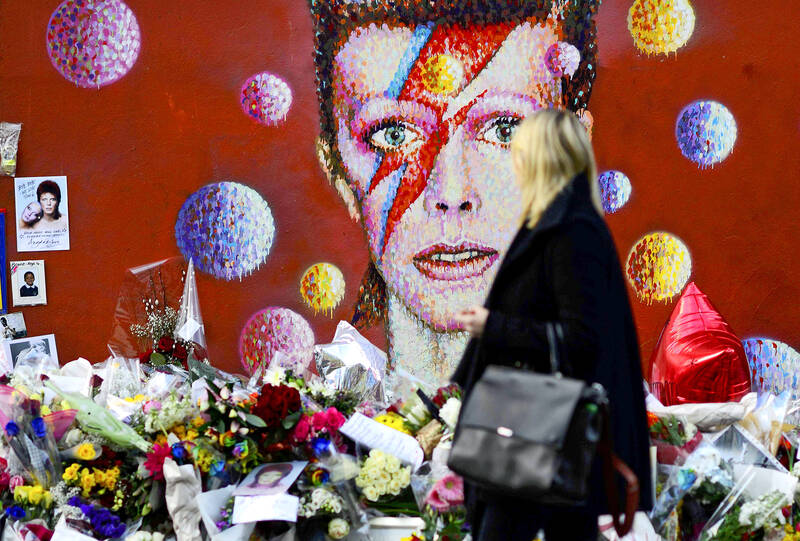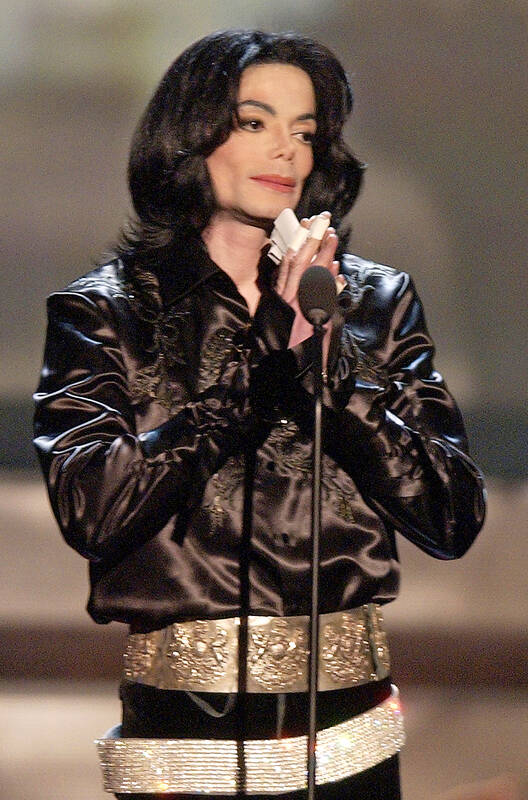Was a Michael Jackson jukebox musical really such a good idea? When MJ the Musical opened in London last week, it was praised for its gravity-defying dancing and raft of floor-filling megahits. But one glaring oversight was unfailingly remarked upon. “In MJ,” ran the New York Times headline, “no one’s looking at The Man in the Mirror.” The show, it added, told the story of Jackson, “except for the big story.”
As Anya Ryan put it in the Guardian’s two-star review: “It is hard to ignore the repeated allegations of child sexual abuse. Yet Lynn Nottage’s script does just that.”
Almost five years after Leaving Neverland, in which two men accused Jackson of sexually abusing them when they were children, it seems not everyone has got the message that the star is “canceled.” In fact, to all intents and purposes, Jackson is not canceled at all. That’s certainly what the money suggests, with Sony recently buying half of his back catalog for a figure believed to be around £500m.

Photo: Reuters
Then there’s a forthcoming biopic starring Jackson’s nephew Jaafar in the lead role. According to Billboard, the Jackson estate earns around US$75.4 million a year from his music, royalties, theatrical shows and merchandise.
So how has this happened? How come some artists seem impervious to the supposed huge shifts in public opinion in the wake of #MeToo and Black Lives Matter? David Bowie is a striking example. Claims after his death by Lori Mattix and Dana Gillespie that he had had sex with them when they were under the age of consent (15 and 14, respectively) have largely been ignored, dismissed or at least treated completely differently to other male stars similarly accused. Is it because the women in question bore no ill will towards Bowie, with Mattix saying their encounter was “so beautiful … Who wouldn’t want to lose their virginity to David Bowie?”
If, as we are led to believe, cancel culture is so pervasive, why does Bowie remain a hero? Are there some artists whose reputations will survive anything simply because they’re so adored? Or is there more to it than that?

Photo: AP
I initially thought there might be some clear-cut factors that helped determine why some artists are ostracized and others are not. For instance, you might think still being alive makes you more cancelable — your misdemeanors will not only be more current but you’re also still around to profit from your art. But the very much dead Ike Turner (accused of multiple violent incidents by his former wife Tina Turner) could easily be described as canceled, whereas non-dead Chris Brown (who pleaded guilty to felony assault of his then-girlfriend Rihanna) is still getting Grammy nominations.
How do you grapple with cases in which there are conflicting views and gray areas? Does Morrissey’s embrace of far-right political groups such as For Britain have to be weighed on some kind of moral scale against Johnny Marr’s progressive values, to work out if the Smiths are canceled? Should Benjamin Zephaniah be shunned for being violent towards a former girlfriend, or is he excused because he was the one who wrote about it, expressing regret and the need to be better? Before long, my list of factors had spiralled into a tangle of nuances and contradictions.
With all these questions rolling around my head, I turned to other writers for advice. In her book Monsters: A Fan’s Dilemma, Claire Dederer writes about the specific pull Bowie had on young minds: “David Bowie was the patron saint of weird kids … For kids like me, there was a sense of ownership; Bowie was ours.
This intense connection meant that many overlooked the accusations. But for Dederer, it made them cut deeper. Other famous bands might have slept with teenage girls, she writes, “but not our guy.” So does it just come down to an emotional attachment?
Not everyone is on board with Dederer’s thinking. Jessa Crispin, critic and editor of Substack publication The Culture We Deserve, criticized Monsters for an overreliance on emotions over intellect and logic. She believes Bowie has avoided cancellation because “anyone who built up a loyal following before the advent of social media is ultimately immune from it. That doesn’t mean they won’t come in for rounds of backlash, but the affection people have for their work will survive.”
This is not the first time Bowie has faced a backlash. In the 1970s, he was called out for expressing sympathy with the far right and calling Hitler the “first rock star.” But Jerome Soligny, who wrote last year’s Bowie biography Rainbowman, doesn’t believe the accusations amount to much.
“Bowie did say a couple of things he would regret later. Who didn’t? A lot was written at the time but we know now it was misconception from the press. Any fans who’ve read my work would know that Bowie was certainly not a right-wing racist.”
And the accusations that he slept with young teenagers? “I’ve talked with Dana many times. Obviously, with rock stars, everything could have happened. And everything did. Regarding Bowie and a few other famous musicians, what they brought to the world is so huge that, yes, people tend to forget.”
The more people I speak to, the clearer it becomes that nobody has fixed views on what cancellation involves, or even what it is. In truth, “canceled” is a fairly woolly term that can get confused with public criticism. Artists have long been attacked when their behavior has upset certain groups of society, from the Beatles (whose records were actually burned after John Lennon claimed they were “bigger” than Jesus) to the Chicks (who were blacklisted by some country music radio stations for criticizing President George W Bush in the lead-up to the Iraq war). Rarely does it mean that an artist is completely finished. People still watch Harvey Weinstein’s films even though he’s rotting in jail. Even R Kelly, perhaps the most open-and-shut case of cancellation imaginable, racks up 5 million listeners on Spotify each month. So does cancel culture really exist at all?
Crispin says it does, but perhaps not in the way we had originally intended. “There is something at the root of cancel culture,” she says, “that comes out of a frustration that certain people are given the opportunity and means to abuse other people with impunity, and that the abuse has been disproportionately suffered by marginalized people, whether it is women, trans people, non-white people, and so on.”
But in reality, proper cancellation probably only happens for “people who don’t have the monolithic presence in their field — the debut artists, the non-tenured professor, the writer with only a couple of books out,” she says.
Artists will often “survive” cancellation, whatever we mean by that, because there are sufficient people out there who approach their art unencumbered with conflicted feelings about doing so. There are no set rules, because we each make our own rules. Which is why for some people, R Kelly (canceled!) is still fine to listen to, while for others Bowie (not canceled!) is persona non grata.

During the Metal Ages, prior to the arrival of the Dutch and Chinese, a great shift took place in indigenous material culture. Glass and agate beads, introduced after 400BC, completely replaced Taiwanese nephrite (jade) as the ornamental materials of choice, anthropologist Liu Jiun-Yu (劉俊昱) of the University of Washington wrote in a 2023 article. He added of the island’s modern indigenous peoples: “They are the descendants of prehistoric Formosans but have no nephrite-using cultures.” Moderns squint at that dynamic era of trade and cultural change through the mutually supporting lenses of later settler-colonialism and imperial power, which treated the indigenous as

By 1971, heroin and opium use among US troops fighting in Vietnam had reached epidemic proportions, with 42 percent of American servicemen saying they’d tried opioids at least once and around 20 percent claiming some level of addiction, according to the US Department of Defense. Though heroin use by US troops has been little discussed in the context of Taiwan, these and other drugs — produced in part by rogue Chinese Nationalist Party (KMT) armies then in Thailand and Myanmar — also spread to US military bases on the island, where soldiers were often stoned or high. American military policeman

The Venice Film Festival kicked off with the world premiere of Paolo Sorrentino’s La Grazia Wednesday night on the Lido. The opening ceremony of the festival also saw Francis Ford Coppola presenting filmmaker Werner Herzog with a lifetime achievement prize. The 82nd edition of the glamorous international film festival is playing host to many Hollywood stars, including George Clooney, Julia Roberts and Dwayne Johnson, and famed auteurs, from Guillermo del Toro to Kathryn Bigelow, who all have films debuting over the next 10 days. The conflict in Gaza has also already been an everpresent topic both outside the festival’s walls, where

An attempt to promote friendship between Japan and countries in Africa has transformed into a xenophobic row about migration after inaccurate media reports suggested the scheme would lead to a “flood of immigrants.” The controversy erupted after the Japan International Cooperation Agency, or JICA, said this month it had designated four Japanese cities as “Africa hometowns” for partner countries in Africa: Mozambique, Nigeria, Ghana and Tanzania. The program, announced at the end of an international conference on African development in Yokohama, will involve personnel exchanges and events to foster closer ties between the four regional Japanese cities — Imabari, Kisarazu, Sanjo and